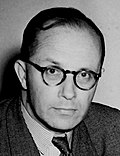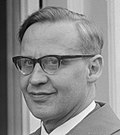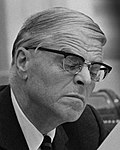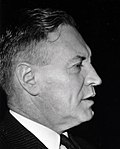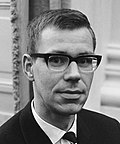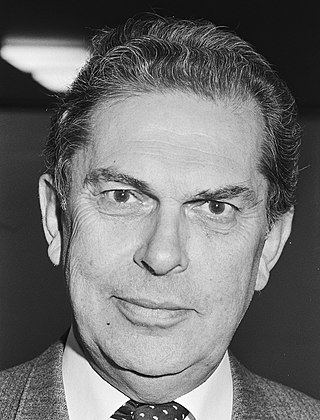
Barend Willem Biesheuvel was a Dutch politician of the defunct Anti-Revolutionary Party (ARP) now the Christian Democratic Appeal (CDA) party and jurist who served as Prime Minister of the Netherlands from 6 July 1971 until 11 May 1973.

Jelle Zijlstra was a Dutch politician of the defunct Anti-Revolutionary Party (ARP) now the Christian Democratic Appeal (CDA) party and economist who served as Prime Minister of the Netherlands from 22 November 1966 until 5 April 1967.

The second Biesheuvel cabinet was the executive branch of the Dutch Government from 9 August 1972 until 11 May 1973. The cabinet was formed by the christian-democratic Catholic People's Party (KVP), Anti-Revolutionary Party (ARP) and Christian Historical Union (CHU) and the conservative-liberal People's Party for Freedom and Democracy (VVD) after the fall of the previous Cabinet Biesheuvel I. The cabinet was a centre-right caretaker government and had a minority in the House of Representatives. Protestant Leader Barend Biesheuvel of the Anti-Revolutionary Party served as Prime Minister. Prominent Catholic politician Roelof Nelissen served as Deputy Prime Minister and Minister of Finance and former Liberal Leader Molly Geertsema served as Deputy Prime Minister and Minister of the Interior. The rump cabinet served until the election of 1972.

The first Biesheuvel cabinet was the executive branch of the Dutch Government from 6 July 1971 until 9 August 1972. The cabinet was formed by the christian-democratic Catholic People's Party (KVP), Anti-Revolutionary Party (ARP) and Christian Historical Union (CHU), the conservative-liberal People's Party for Freedom and Democracy (VVD) and the social-democratic Democratic Socialists '70 (DS'70) after the election of 1971. The cabinet was a centrist coalition and had a slim majority in the House of Representatives with Protestant Leader Barend Biesheuvel a former Minister of Agriculture serving as Prime Minister. Prominent Catholic politician Roelof Nelissen the Minister of Economic Affairs in the previous cabinet served as Deputy Prime Minister, Minister of Finance and was given the portfolio of Suriname and Netherlands Antilles Affairs, former Liberal Leader Molly Geertsema served as Deputy Prime Minister and Minister of the Interior.

The De Jong cabinet was the executive branch of the Dutch Government from 5 April 1967 until 6 July 1971. The cabinet was formed by the christian-democratic Catholic People's Party (KVP), Anti-Revolutionary Party (ARP) and Christian Historical Union (CHU) and the conservative-liberal People's Party for Freedom and Democracy (VVD) after the election of 1967. The cabinet was a centre-right coalition and had a substantial majority in the House of Representatives with prominent Catholic politician Piet de Jong the Minister of Defence in the previous cabinet serving as Prime Minister. Prominent Liberal politician Johan Witteveen a former Minister of Finances served as Deputy Prime Minister and returned as Minister of Finance, prominent Protestant politician Joop Bakker the Minister of Economic Affairs in the previous cabinet served as Deputy Prime Minister, Minister of Transport and Water Management and was given the portfolio of Suriname and Netherlands Antilles Affairs.

The Third Drees cabinet, also called the Fourth Drees cabinet, was the executive branch of the Dutch Government from 13 October 1956 until 22 December 1958. The cabinet was a continuation of the previous Second Drees cabinet and was formed by the social-democratic Labour Party (PvdA) and the christian-democratic Catholic People's Party (KVP), Anti-Revolutionary Party (ARP) and the Christian Historical Union (CHU) after the election of 1956. The cabinet was a Centre-left grand coalition and had a substantial majority in the House of Representatives, with Labour Leader Willem Drees serving as Prime Minister. Prominent KVP politician Teun Struycken served as Deputy Prime Minister and Minister of the Interior, Property and Public Organisations.

The second Beel cabinet was the executive branch of the Dutch Government from 22 December 1958 until 19 May 1959. The cabinet was formed by the Christian-democratic Catholic People's Party (KVP), Anti-Revolutionary Party (ARP), and the Christian Historical Union (CHU) after the fall of the previous Third Drees cabinet. The caretaker cabinet was a centre-right coalition and had a slim majority in the House of Representatives with former Catholic Prime Minister Louis Beel returning as Prime Minister and dual served as Minister of Social Affairs and Health. Prominent Catholic politician Teun Struycken continued as Deputy Prime Minister and Minister of the Interior, Property and Public Organisations from previous cabinet and dual served as Minister of Justice.

The De Quay cabinet was the executive branch of the Dutch Government from 19 May 1959 until 24 July 1963. The cabinet was formed by the christian-democratic Catholic People's Party (KVP), Anti-Revolutionary Party (ARP) and Christian Historical Union (CHU) and the conservative-liberal People's Party for Freedom and Democracy (VVD) after the election of 1959. The cabinet was a centre-right coalition and had a substantial majority in the House of Representatives with prominent Catholic politician Jan de Quay the former Queen's Commissioner of North Brabant serving as Prime Minister. Prominent Liberal politician Henk Korthals served as Deputy Prime Minister, Minister of Transport and Water Management and was given the portfolio of Suriname and Netherlands Antilles Affairs.
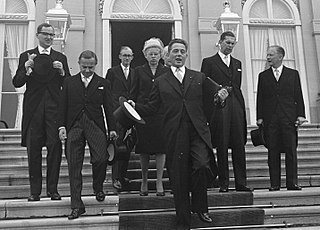
The Marijnen cabinet was the cabinet of the Netherlands from 24 July 1963 until 14 April 1965. The cabinet was a continuation of the previous De Quay cabinet and was formed by the Christian democratic Catholic People's Party (KVP), Anti-Revolutionary Party (ARP) and Christian Historical Union (CHU) and the conservative liberal People's Party for Freedom and Democracy (VVD) after the election of 1963. The cabinet was a centre-right coalition and had a substantial majority in the House of Representatives with prominent Catholic politician Victor Marijnen the Minister of Agriculture and Fisheries in the previous cabinet serving as Prime Minister. Protestant Leader Barend Biesheuvel served as Deputy Prime Minister, Minister of Agriculture and Fisheries and was given the portfolio of Suriname and Netherlands Antilles Affairs.
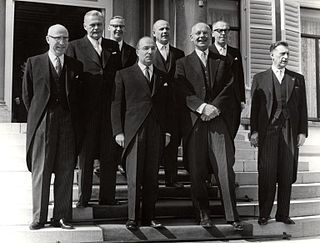
The Cals cabinet was the executive branch of the Dutch Government from 14 April 1965 until 22 November 1966. The cabinet was formed by the christian-democratic Catholic People's Party (KVP) and Anti-Revolutionary Party (ARP) and the social-democratic Labour Party (PvdA) after the fall of the previous Cabinet Marijnen. The cabinet was a Centre-left coalition and had a substantial majority in the House of Representatives; prominent Catholic politician Jo Cals, a former Minister of Education, served as Prime Minister. Labour Leader Anne Vondeling served as Deputy Prime Minister and Minister of Finance, Protestant Leader Barend Biesheuvel continued as Deputy Prime Minister, Minister of Agriculture and Fisheries and the responsibility for Suriname and Netherlands Antilles Affairs from previous cabinet.
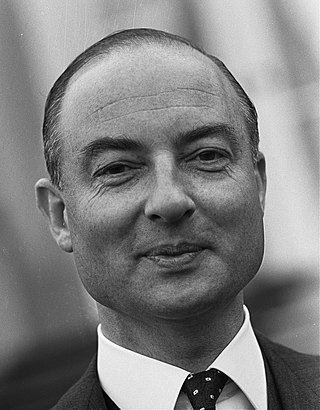
Wilhelm Klaus Norbert Schmelzer was a Dutch politician, diplomat and economist who served as Leader of the Catholic People's Party (KVP) from 1963 to 1971 and Minister of Foreign Affairs from 1971 to 1973.
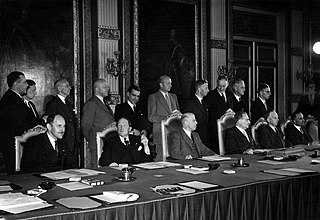
The Second Drees cabinet, also called the Third Drees cabinet was the executive branch of the Dutch Government from 2 September 1952 until 13 October 1956. The cabinet was formed by the social-democratic Labour Party (PvdA) and the christian-democratic Catholic People's Party (KVP), Anti-Revolutionary Party (ARP) and Christian Historical Union (CHU) after the election of 1952. The cabinet was a Centre-left grand coalition and had a majority in the House of Representatives with Labour Leader Willem Drees serving as Prime Minister. Former Catholic Prime Minister Louis Beel served as Deputy Prime Minister and Minister of the Interior.

The Theo Heemskerk cabinet was the cabinet of the Netherlands from 12 February 1908 until 29 August 1913. The cabinet was formed by the political party Anti-Revolutionary Party (ARP) and the General League of Roman Catholic Caucuses (ABRK) following the fall of the De Meester cabinet 21 December 1907. The centre-right cabinet was a minority government in the House of Representatives but was supported by Independent Catholics and Independent Protestants for a majority. After the election of 1909 the Anti-Revolutionary Party and the General League of Roman Catholic Caucuses received a plurality of the votes and the cabinet could continued to govern as a majority government from 27 July 1909. Theo Heemskerk of the Anti-Revolutionary Party was Prime Minister.
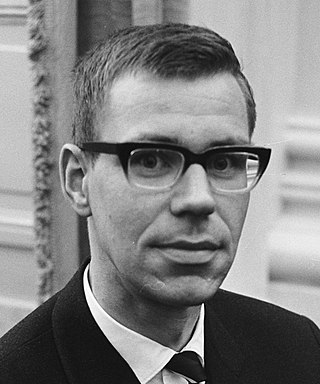
Johan Hendrik "Hans" Grosheide was a Dutch politician of the defunct Anti-Revolutionary Party (ARP) and later the Christian Democratic Appeal (CDA) party and jurist.









